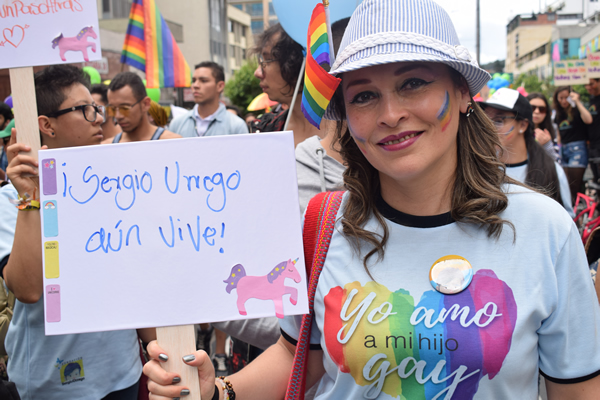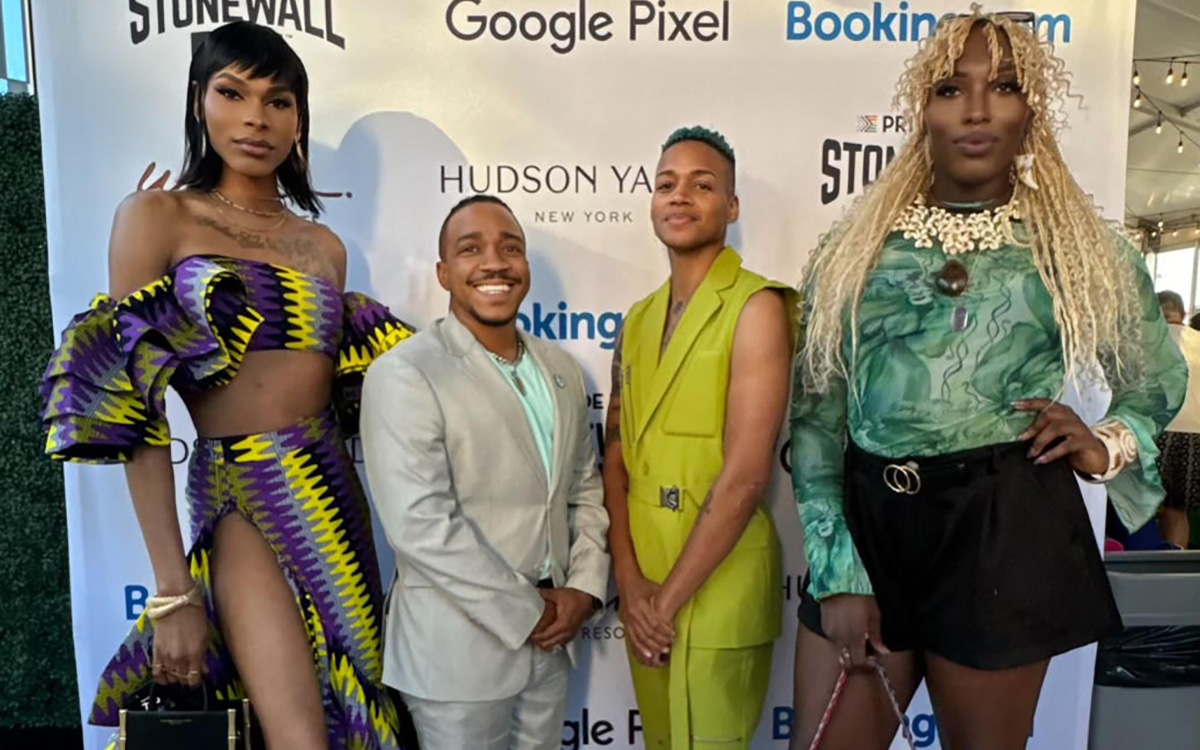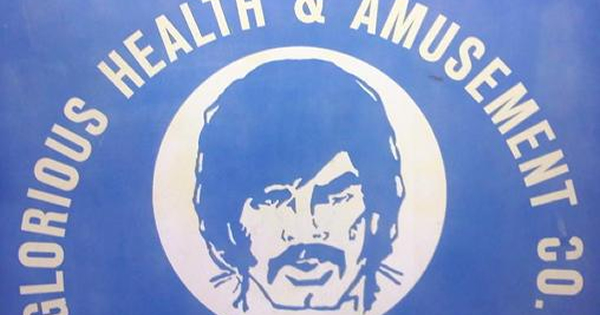News
Madre de Sergio Urrego lucha contra el bullying en Colombia
Alba Lucía Reyes Arenas se convirtió en una activista vocal


Alba Lucía Reyes Arenas en Bogotá, Colombia, el 24 de septiembre de 2018. Su hijo, Sergio Urrego, se suicidó en 2014 después de ser víctima del bullying homofóbico por parte de la administración de su colegio en la capital colombiana. (Foto del Washington Blade por Michael K. Lavers)
Ella dijo al Washington Blade el 24 de septiembre durante una entrevista en la capital colombiana de Bogotá que le gustaba la opera desde era “bien joven” y leyó su primer libro, “Historias sin fin,” cuando tenía seis años. Reyes dijo que su hijo era ateo y le gustaba el arte y las políticas.
Urrego también era miembro de un grupo de estudiantes anarquistas.
“Tengo muchas cosas que contarte,” dijo Reyes. “Para todas las mamás, nuestros hijos son muy especiales, pero Sergio si es desde era una personita si se interesaba por las cosas que son eran más de su edad.”
Urrego tenía 16 años cuando se suicidó el 4 de agosto de 2014.
Administradores y un psicólogo al colegio católico de Urrego en Bogotá lo atacaron después de que un maestro vio una foto de él besando a su novio en su móvil.
Los padres del novio de Urrego le acusaron de abusar sexualmente a su hijo. Urrego debía haber comenzado a asistir otro colegio el día después de su suicidio.
La muerte del hijo ‘fue algo angustiaste’
Reyes estaba en la ciudad colombiana de Cali cuando supo por primera vez que algo andaba mal con su hijo.
Ella regresó a Bogotá y llegó a su hogar alrededor de las 9:30 p.m. Reyes dijo entre lágrimas que la primera cosa que encontró era una nota con “letra muy grande” de su hijo.
Reyes dijo que al principio pensó que se lo había dejado a su madre, pero fue por ella. Reyes dijo al Blade que su hijo escribió, “Yo no podía ir al colegio porque se me presento un problema.”
“Cuando yo vi esta nota, yo dije algo pasó,” ella dijo.
Reyes dijo que luego fue al dormitorio de su hijo y encontró libros en su cama y una nota que le pedía que se los diera a sus mejores amigos. Reyes también encontró otras notas que su hijo había escrito antes de su suicidio.
“Fue algo angustiaste,” ella dijo. “Fue doloroso.”
Ley colombiana ahora prohíbe discriminación homofóbica en escuelas
La muerte de Urrego provocó indignación entre los activistas LGBTI en Colombia.
Reyes el 11 de septiembre de 2014 presentó una tutela contra del colegio de Urrego.
Un tribunal en Bogotá, unas semanas después, falló que Urrego había sido víctima de discriminación, pero Reyes no recibió ningún daño y el fallo no ordenó al Ministerio de Educación de Colombia que revisará las políticas del colegio.
Reyes apeló el fallo ante el Consejo de Estado, que considera las apelaciones de los tribunales administrativos. El entonces Procurador Alejandro Ordóñez — un oponente vocal de los derechos LGBTI que el presidente Iván Duque el pasado mes nombró como el nuevo embajador colombiana ante la Organización de Estados Unidos — falló en contra de Reyes basándose en que las escuelas tenían el derecho de prohibir “los besos y los abrazos.”
La rectora del colegio, Amanda Azucena Castillo, renunció el 10 de octubre de 2014. La Corte Constitucional de Colombia el 21 de agosto de 2015 revocó la decisión del Consejo de Estado y falló a favor de Reyes el 11 de diciembre de 2015.
Escuelas en Colombia no pueden discriminar en contra de sus estudiantes por razón de su orientación sexual. Una enmienda a la ley de no discriminación que incluye el nombre de Urrego también requiere que las escuelas colombianas actualicen sus políticas para garantizar que no sean discriminatorias contra la comunidad LGBTI.
‘Siempre me acompaña’
Reyes desde la muerte de su hijo se ha convertido en una activista vocal contra el bullying.
Ella estaba entre los 31 activistas LGBTI desde todo el mundo que asistió una cumbre del Human Rights Campaign que se realizó en Washington en abril.
Reyes en mayo viajó a Cuba para participar en eventos del Día Internacional contra la Homofobia, la Transfobia y la Bifobia que fueron organizados por el Centro Nacional de Educación Sexual (CENESEX). Mariela Castro, la directora del CENESEX que es la hija del expresidente cubano Raúl Castro, invitó a Reyes de participar en un taller a la sede del CENESEX en La Habana.
Reyes este año lanzó oficialmente la Fundación Sergio Urrego, que busca poner el fin a la discriminación en las escuelas colombianas y evitar el suicidio entre ellos que sufren la discriminación.
El dijo al Blade que el suicidio es la segunda causa de muerte en “nuestros jóvenes.” Reyes también notó estadísticas que indican 192 personas entre las edades de 15 y 24 en Bogotá se suicidaron este año.
“Es algo que aquí no se toca,” ella dijo. “No hay una institución que se brindando atención inmediatamente a los niños que están en crisis.”
La fundación ha respondido a casi 70 casos. También tiene talleres para niños y padres en empresas y en otros lugares por el país.
“Mi propósito es evitar que casos como los de Sergio de se sucede,” dijo Reyes.
Reyes en julio habló a un concierto en la Plaza Bolívar de Bogotá durante las celebraciones del Orgullo de la ciudad. Se terminó el 25 de septiembre una campaña de los medios sociales de la fundación con el hashtag “Celebro soy yo” que buscaba dar recursos y seguridad para aquellos que sufren discriminación.
“Esa campaña me da fuerza para continuar, para seguir,” dijo Reyes. “Ese tipo de campaña se ayudan. Ese tipo de campaña llegan al corazón de la gente.”

Alba Reyes participa en una marcha del Orgullo en Bogotá, Colombia, el 1 de julio de 2018. (Foto cortesía de Fundación Sergio Urrego.)
Reyes terminó la entrevista por decir que su hijo sería orgulloso de ella y del trabajo que hace en su nombre.
“Sea un angelito,” ella dijo. “Siempre me acompaña.”

It is common knowledge that women earn 84% of the average worker. Less common knowledge? Trans women earn 60% of the average worker. Trans men and non-binary people come in at around 70%, while 16% of all trans people make less than $10,000 annually.
E.C. Pizarro was lucky, and he knew it. He had a BFA in graphic design and had taught himself how to code. As a stealth trans man in a corporate job, he had access to a stable wage and good benefits. “People that do not have experiences in corporate America or with equitable employment don’t realize [these things] are privileges that a lot of people don’t have access to.”
He wanted to give back and was gearing up to bring more volunteer work into his life by participating in a fraternity for trans men. When he went to a TransTech event and learned about the educational and career resources for trans people who face barriers to entering the workforce, he knew he had found his place.
At the event he met, Angelica Ross. Yes, that Angelica Ross, of “Pose” and “American Horror Story.”
Before she was Candy, Ross was a self-taught coder. She went from posing for an adult website to doing its back-end coding to teaching her trans siblings how to succeed in tech.
“Technology was the key to my freedom,” Ross said in an interview with The Plug. “Technology took me from being exploited on someone’s website to building my own websites and to building websites for other people and getting paid to do so.”
Pizarro was impressed and wanted to help. “I went up to Angelica and I was like ‘Hey, I’m a trans man. These are my skills. I’m down to volunteer and do any type of work—the one caveat is that I’m stealth. You can’t tell anybody that I’m trans.’”
For four years, Pizarro helped from mostly behind the scenes, sometimes getting side-eyed since people thought he was a cis man in trans spaces. “I was still stealth as the Director of Social Media and Communications for the National Trans Visibility March in 2019,” Pizarro says, chuckling a little.
But by that point, Ross — who headlined the 2019 march — was overextended trying to balance being a world-famous actress, advocate, and businesswoman.
She needed someone to step in as executive director of TransTech and looked to the group of dedicated volunteers. Pizarro was elected by his peers to take the reins of the organization.
This was a turning point for Pizarro. “I’m very passionate about tech and for me a small sacrifice of being open with my trans experience to liberate other trans people,” he said. “I felt like if that’s something I got to do, then I’m gonna do it.”
And he did it. The infrastructure Ross put together worked: with mentorship, education, community, and networking with trans-accepting employers, trans people were gaining financial security and independence.
So, Pizarro focused on expanding TransTech as widely as possible. “We have grown exponentially over the last three years,” he says. “When I took over in 2021, we had about 800 members based in the United States. Now we support over 6,700 members across 50 countries.”
TransTech is filling a demonstrated need within specifically the trans community. New research from LGBT Tech found that 68% of transgender adults use the internet to find LGBTQ-friendly employment (compared to 38% of cisgender LGBTQ+ adults). More than 70% of all LGBTQ adults use the Internet to access educational content.
Accessibility is central to the TransTech programming. Despite the growth, everything remains free. “There’s no membership fee. All of our programming is free. All of the certifications and educational resources are free,” Pizarro says.
They know the financial burden the trans community faces — 29% of trans adults live in poverty. “If we’re asking anyone to up-skill [for a cost] and these are the things they are going through, we are asking them to invest in their future versus their meal today.”
Pizarro believes that accessibility is more than just making the training free. He wants the community to understand that tech work is something they are innately capable of doing.
“TransTech was built on the foundation of nontraditional tech. It’s not always coding. It’s graphic design. It’s social media. It’s video editing. It’s anything that uses a piece of technology and nowadays almost everything uses a piece of technology,” says Pizarro.
He emphasizes to participants: “You’re in tech and you don’t even know it,” pointing out how many already utilize tech skills like marketing and monetization with their social media accounts.
Some people involved in the programming are nervous about entering the “tech world” because of headlines about tech layoffs. He makes sure to emphasize that unlike in some other jobs, tech companies often pay generous severance packages, which gives employees “breathing room.” Pizzaro explains that “once you have experience with one tech company, you can go someplace else and make a substantial amount of money as well.”
While TransTech is designed for the gender-diverse community, the programming is open to everyone Pizarro explains. “We just ask that you don’t be transphobic.” (Or any of the other -phobics too, he says, listing them off.) He also emphasizes that this allows trans members who are not out to comfortably participate.
Pizarro wants everyone to understand that they don’t just belong in tech, but they make tech better. “Tech is most profitable when you have diverse people building the tech and using the tech,” Pizarro says. “There is an intentional funding as well as support to diversity tech because they understand how that impacts the product.”
He also reminds participants that they have developed transferrable skills in every part of their lives. “I like to tell people if you can manage your life as a trans person in the United States or anywhere you can manage a project.”

District of Columbia
Fire by arson forced temporary shutdown of Glorious Health Club
Spa and art gallery catering to gay
men expects to reopen in August

In a little noticed development, D.C.’s Glorious Health Club, which bills itself as a spa, art gallery, and community center catering to gay men, was forced to close on May 19 after one or more unidentified suspects ignited a fire inside the club that D.C. fire department officials have ruled an act of arson.
Robert Siegel, the club’s owner, told the Washington Blade that he and investigators with the D.C. Fire and Emergency Medical Services Department believe one or more yet unidentified suspects broke into the kitchen of the former warehouse building where the club is located at 2120 West Virginia Ave., N.E.
According to Siegel, investigators with the fire department’s arson squad believe a flammable liquid was used to start the fire in the kitchen and in two other locations within the building.
“Three separate fires were started,” Siegel said. “They started one on a staircase and one on the upstairs storage area,” he said in addition to the one in the kitchen. He said about 40 patrons were in the club at the time the fire started, and all were able to leave without injury.
Siegel said the fire caused $500,000 worth of damage to his building, with some of the damage caused — understandably he said — by fire fighters who had to rip open doors and break through the roof to gain access to the flames that engulfed parts of the interior of the building. He said he arranged for repair work to begin after the fire was extinguished.
“I expect we’ll be reopening in about a month from now,” he said. “And we’ll be a bigger and better place.”
Fortunately, Siegel said, most of the artwork and art exhibits located in the club were not damaged.
“It was basically the kitchen, patio, and the roof,” he said, adding that much of the solar panels he had on the roof were destroyed by the fire or by firefighters seeking to gain access to the building.
“And the fire was so hot it did structural damage to the roof,” he said. “It actually melted steel. We’re talking about 50-foot steel beams that have to be replaced,” he told the Blade. “That’s $100,000 right there.”
Vito Maggiolo, a spokesperson for the D.C. Fire and Emergency Medical Services Department, said the fire was “ruled incendiary/arson” and is “under active investigation.”
It could not immediately be determined if one or more people responsible for the fire targeted the Glorious Health Club because it’s a gay community establishment.
South America
Chilean capital Pride parade participants, activists attacked
Men wearing hoodies disrupted June 29 event in Santiago

A group of hooded men on June 29 attacked LGBTQ activists and others who participated in the Chilean capital’s annual Pride parade.
Witnesses said the men punched and kicked activists and parade participants, threatened them with a skateboard, threw stones and paint at floats and damaged parade infrastructure. The men also broke a truck’s headlight.
The Movement for Homosexual Integration and Liberation, a Chilean LGBTQ rights group known by the acronym Movilh, strongly condemned the acts of violence, calling them deliberate attempts to disrupt a peaceful and safe demonstration.
“Vandalism that seeks to transgress the peaceful trajectory of our demonstrations and that is only useful to the interests of the homo/transphobic sectors,” denounced Movilh.
The attack occurred when the hooded men tried to break through the security fence protecting the participants and the truck that was at the beginning of the parade.
“As we do every year, we fence the truck with our volunteers to prevent anyone from being run over or hurt by the wheels,” said Movilh. “The hooded men approached the fence to break it, hitting our volunteers and people outside of our organization with their feet and fists who, in an act of solidarity, tried to dissuade them.”
The motives behind this attack seem to be related to previous calls on social networks to boycott the event, although the organizers stressed that violent acts are alien to the parade’s inclusive and celebratory purpose.
Movilh spokesperson Javiera Zúñiga told the Washington Blade that “after the attack that we faced during the Pride March, we published in our social networks the few images that were available from that moment.”
“What we are basically asking is that anyone who has seen something and can recognize any of the aggressors write to our email or (contact us) through our social networks so that we can file complaints and do whatever is necessary to find those responsible.”
Zúñiga stated that “not only was there aggression against people, but there was also damage to private property because they broke one of the truck’s headlights.”
“So for these two reasons we are looking for anyone who may have information to contact us,” she said.
The incident has generated widespread condemnation within the LGBTQ community and outside of it. They say it highlights the need to protect human rights and diversity and promote respect for them.
-

 Canada2 days ago
Canada2 days agoToronto Pride parade cancelled after pro-Palestinian protesters disrupt it
-

 Baltimore4 days ago
Baltimore4 days agoDespite record crowds, Baltimore Pride’s LGBTQ critics say organizers dropped the ball
-

 Sports5 days ago
Sports5 days agoHaters troll official Olympics Instagram for celebrating gay athlete and boyfriend
-

 U.S. Supreme Court1 day ago
U.S. Supreme Court1 day agoConcern over marriage equality in US grows two decades after first Mass. same-sex weddings







